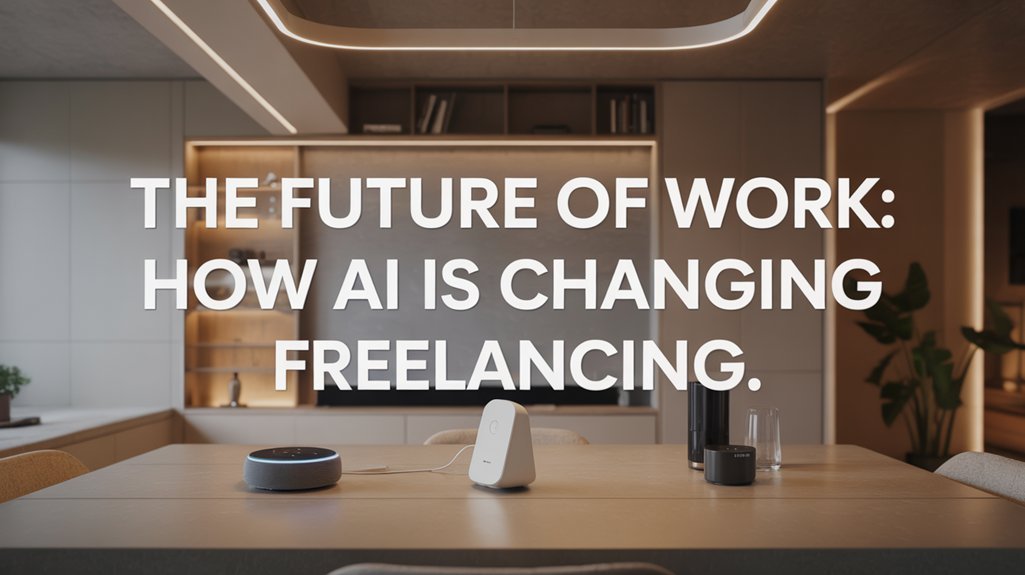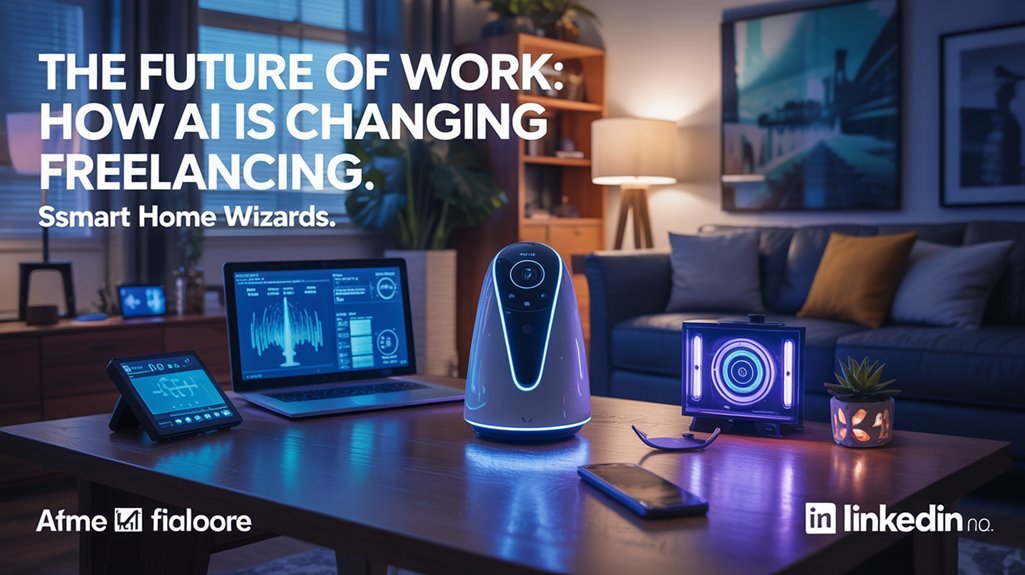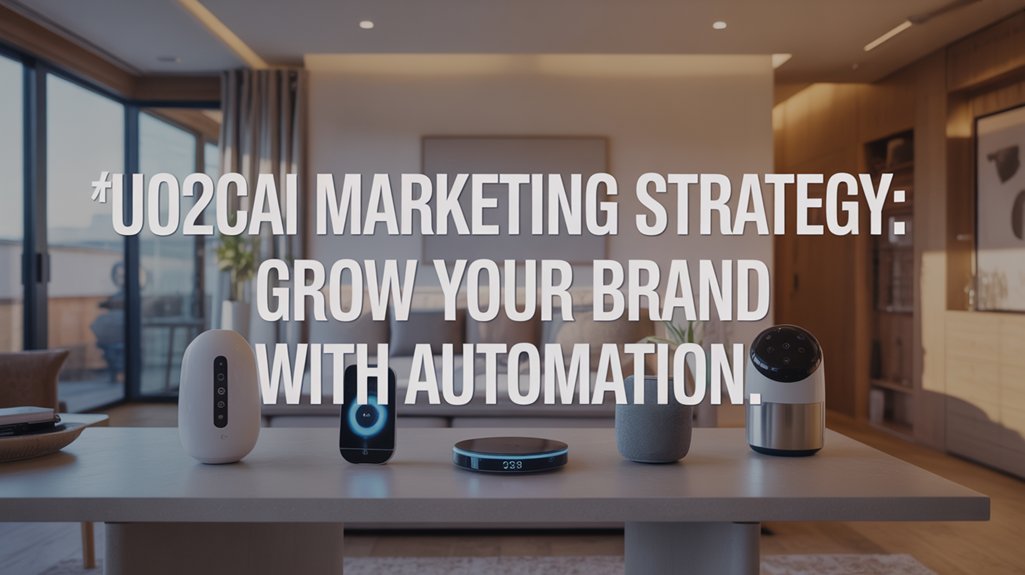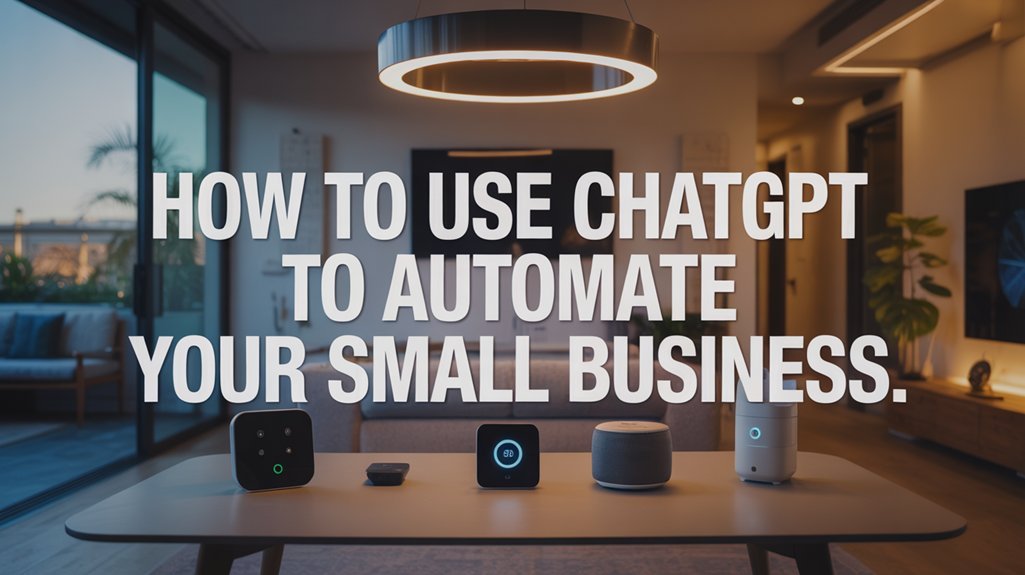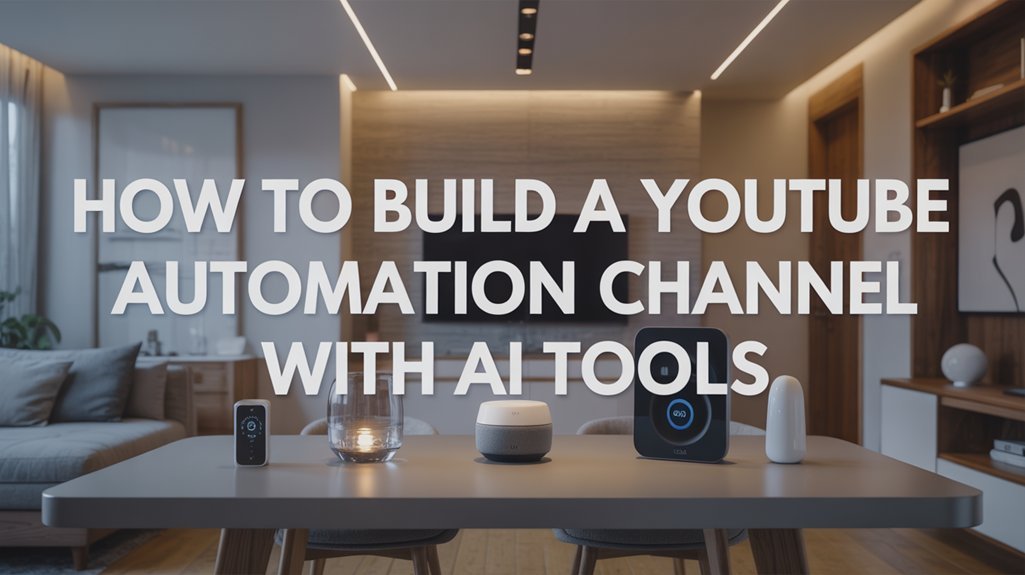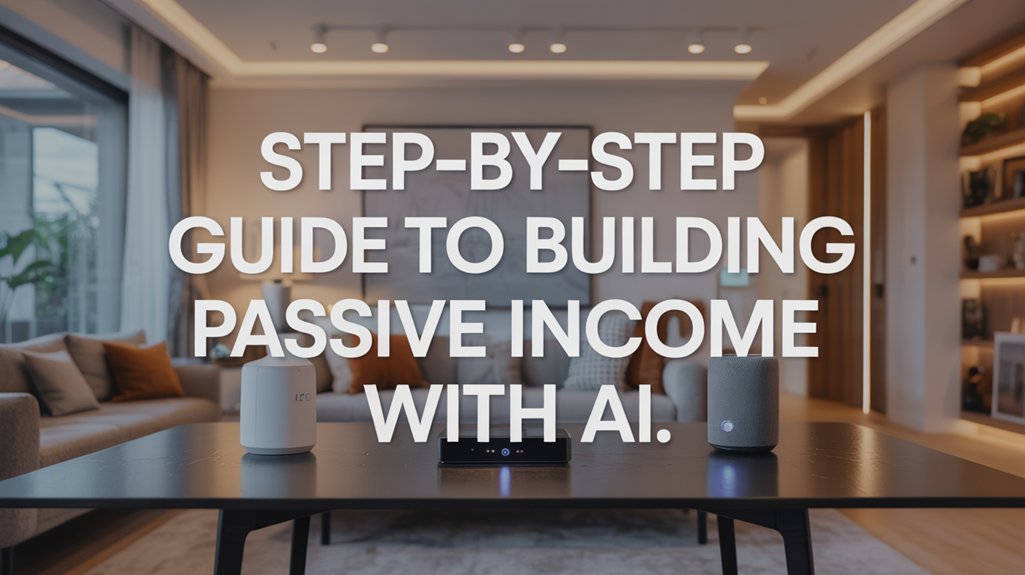AI is fundamentally restructuring your freelance career landscape, with text-heavy occupations experiencing a 2% contract decline and 5% earnings drop since ChatGPT's emergence. You'll face a bifurcated market where basic services face automation threats while specialized roles like prompt engineers command 40-60% premium rates. Your survival depends on shifting from hourly billing to value-based pricing models and mastering AI tools as productivity multipliers rather than viewing them as competition. The structural shifts ahead demand strategic realignment to capture emerging opportunities.
Key Takeaways
- AI automation has caused a 2% decline in freelance contracts and 5% drop in earnings for text-heavy occupations since ChatGPT emerged.
- New specialized roles like prompt engineers and AI consultants command 40-60% higher rates than traditional freelance positions in today's market.
- Hourly billing models are becoming obsolete as clients increasingly pay for outcomes and strategic value rather than time invested in projects.
- Freelancers must combine AI proficiency with domain expertise and master prompt engineering to remain competitive against automation threats.
- Continuous reskilling and value-based pricing strategies are essential for freelancers to capture premium positioning in AI-transformed markets.
The Rise of AI-Powered Tools and What They Mean for Freelancers
AI-powered tools have fundamentally altered the freelance landscape since 2022, creating a bifurcated market where automation simultaneously threatens basic services and generates new opportunities.
You're witnessing a 2% contract decline and 5% earnings drop in text-heavy fields as ChatGPT, Jasper, and Grammarly execute routine tasks at lower costs. However, this disruption isn't total displacement—it's market restructuring.
Freelancers need strategic repositioning to capture emerging value chains. Content creation now demands AI proficiency alongside domain expertise, as clients expect faster delivery without quality compromise.
You'll stay competitive by mastering prompt engineering and AI model training—roles that didn't exist three years ago.
The data reveals your path forward: automation tools handle repetitive workflows while you concentrate on strategic problem-solving that machines can't replicate.
Marketplaces are integrating AI capabilities directly into their platforms, making technical fluency non-negotiable. Your competitive advantage lies in orchestrating these technologies rather than competing against them.
Understanding applied AI for businesses is crucial for freelancers looking to position themselves as strategic partners rather than task executors.
New Opportunities: Emerging Roles in the AI Era
While automation eliminates routine tasks, it's simultaneously creating specialized roles that command premium rates in the freelance economy.
You'll find lucrative opportunities as prompt engineers, AI trainers, and AI consultants—positions that didn't exist three years ago. These new roles require your human expertise to refine AI outputs, analyze data patterns, and integrate systems into business workflows.
The market's rewarding strategic thinking over execution speed.
Strategic thinking now earns more than fast execution—the freelance market pays premiums for judgment, not just speed.
You're positioned to take advantage of brand strategy, user experience research, and AI model optimization—services that demand nuanced judgment machines can't replicate. This shift's driving adoption of value-based pricing models, where you'll invoice based on measurable impact rather than billable hours.
Your competitive advantage lies in specialization.
Companies aren't seeking generalists who compete with AI-powered tools; they're paying premiums for professionals who utilize AI while providing irreplaceable strategic insight.
The data's clear: specialized AI-adjacent roles command 40-60% higher rates than traditional freelance positions. To maximize your content's visibility and reach in this evolving landscape, leveraging AI writing tools combined with SEO optimization strategies can help you establish authority in these emerging niches.
From Hourly Billing to Value-Based Pricing: A Necessary Shift

These specialized roles require a fundamental rethinking of how you price your services. The data is unequivocal: AI-driven automation has decimated the hourly billing model's viability. Web design projects compressed from 10 to 2 hours exemplify this structural change.
You must pivot to value-based pricing or face margin erosion. This shift demands strategic positioning. Clients now pay for outcomes, not time invested. Your AI-augmented efficiency in content writing becomes irrelevant if you're billing hourly—you're penalizing your own productivity gains.
Value-based pricing frameworks capture the true economic impact you deliver. The competitive advantage lies in expertise monetization. Freelancers who master AI tools while demonstrating measurable business results command premium rates.
Quantify your contributions: revenue increases, cost reductions, market positioning gains. Implementing an AI SEO content optimizer can help demonstrate these measurable outcomes to clients, strengthening your value proposition. This evidence-based approach justifies higher pricing tiers and insulates you from commoditization. Your pricing structure must reflect strategic value creation, not task completion.
Skills That Will Keep You Competitive in an AI-Driven Market
The integration of AI into freelancing fundamentally restructures competitive advantage around three core competencies that align human judgment with technological efficiency.
You'll need to master prompt engineering to extract maximum value from AI tools, develop specialized expertise in domains where contextual knowledge creates barriers to entry, and implement value-based pricing models that capture the economic impact of AI-enhanced productivity.
These skills represent structural adaptations to market forces where generalist capabilities face downward price pressure while strategic AI orchestration commands premium compensation.
Additionally, you can train ChatGPT bots on your proprietary data to create customized AI assistants that understand your specific workflows and client requirements.
Master AI Tool Prompting
Anyone serious about freelancing in 2024 must recognize that prompt engineering has evolved from optional skill to market necessity. The future of freelancing hinges on your ability to architect precise AI commands that alter tools like ChatGPT and Jasper into strategic assets.
Generic prompts generate disposable content; sophisticated prompting creates competitive advantage.
Critical Proficiencies for AI Tool Mastery:
- Iterative Testing: Experiment systematically with prompt variations to identify ideal output parameters for content generation and data analysis tasks.
- Specificity Architecture: Construct detailed, multi-layered requests that eliminate ambiguity and enhance relevance.
- Context Engineering: Embed strategic frameworks within prompts to differentiate your outputs from commoditized AI content.
- Output Calibration: Refine prompts continuously based on client requirements and market positioning objectives.
Master these competencies to command premium rates while human labor remains irreplaceable for strategic oversight.
Develop Deep Niche Expertise
How can freelancers insulate themselves against AI commoditization when language models now generate competent first drafts in seconds?
The future demands strategic positioning through deep niche expertise—specialized knowledge AI tools can't replicate. While algorithms produce generic outputs, mastery of SEO technical architecture, advanced UX research methodologies, or brand strategy frameworks creates defensible competitive advantages.
This isn't about breadth; it's about depth that commands premium rates.
Your upskilling strategy must target domains where human judgment remains irreplaceable. Clients increasingly seek freelancers work that integrates AI capabilities with sector-specific insight—not generalists who merely operate software.
The market will bifurcate: commodity providers facing downward pricing pressure versus specialists who utilize technology while delivering expertise-driven solutions.
Position yourself in the latter category through continuous investment in specialized knowledge domains that resist automation.
Embrace Value-Based Pricing
Hourly billing models fundamentally misalign freelancer incentives with client objectives in AI-augmented workflows.
When AI-generated content completes tasks in minutes rather than hours, time-based pricing erodes your earning potential. Value-based pricing positions you to capture compensation proportional to outcomes delivered, not time expended.
Strategic implementation requires four structural shifts:
- Quantify business impact through metrics like conversion rates, revenue growth, or cost reduction rather than deliverable volume.
- Package unique expertise into tiered service offerings that emphasize proprietary frameworks AI can't replicate.
- Emphasize problem-solving skills that address strategic challenges beyond task execution.
- Establish competitive pricing anchored to client ROI, not market hourly rates.
This pricing architecture alters AI from threat to advantage, positioning your human insight as the premium differentiator clients will pay to access.
Navigating Job Displacement and Market Challenges
As generative AI reshapes the freelance landscape, text-heavy occupations have already experienced measurable economic impact: a 2% decline in contracts and a 5% drop in earnings since ChatGPT's emergence. High-skill workers face disproportionate pressure, as AI compresses the performance differential between experienced freelancers and lower-rated competitors.
| Impact Category | Experienced Freelancers | Lower-Rated Freelancers |
|---|---|---|
| Contract Decline | Steeper drops | Minimal impact |
| Earnings Compression | 5%+ reduction | Stable or improved |
| Competitive Position | Eroding advantage | Narrowing gap |
Job displacement remains ambiguous: AI will take tasks, not necessarily careers. To stay ahead, you must utilize existing labor regulations while advocating for updated policies addressing freelance-specific vulnerabilities. Using AI as a productivity multiplier—rather than viewing it solely as competition—enables strategic repositioning. Historical patterns suggest short-term disruption precedes long-term reorganization, demanding continuous reskilling and adaptation to maintain market dominance.
Adapting Your Freelance Strategy for Long-Term Success

Understanding displacement risks means little without concrete action. You must restructure your remote freelance business model to capture premium positioning in AI-transformed markets.
Strategic Implementation Framework:
- Shift to value-based pricing immediately – Your compensation must reflect deliverable impact, not hours logged. Clients won't pay hourly rates when AI can help complete tasks faster.
- Master tools like ChatGPT as productivity multipliers – Deploy AI for research, drafting, and analysis while you focus on strategic oversight and client relationship management.
- Commit to continuous learning in specialized domains – Develop expertise in areas requiring human judgment: strategic consulting, stakeholder management, and complex problem-solving that AI can't replicate.
- Leverage AI-powered marketplaces strategically – Position yourself on platforms that showcase advanced capabilities and connect you with sophisticated clients seeking high-value expertise.
Your competitive advantage lies in synthesizing AI efficiency with irreplaceable human insight. Execute now or cede market position.
Frequently Asked Questions
Will AI Replace Freelancers?
AI won't completely replace you, but it'll reshape your competitive landscape.
You'll need to utilize AI collaboration tools and pursue skill improvement opportunities to maintain your market position. Freelance market trends show automation advantages threaten routine tasks while creative job roles remain resilient.
You must adapt strategically—differentiate through complex problem-solving and high-value services that AI can't replicate. Your survival depends on embracing these tools rather than competing against them.
Policy frameworks you advocate for will determine your long-term viability in this evolving market structure.
How Has Artificial Intelligence Impacted the Freelancing Industry?
AI tools have restructured freelance platforms by compressing your competitive advantage—high-skill freelancers face 5% earnings drops as job automation eliminates performance differentials.
You'll find creative collaboration increasingly commodified, where lower-tier workers now match your output quality.
While skill improvement opportunities exist, current labor regulations don't protect your market position.
To maintain power, you must utilize AI strategically rather than compete against it, as the traditional reputation-based pricing model you've relied upon is collapsing.
Is AI Going to Replace Jobs in the Future?
AI will partially replace jobs, but you'll see workforce adaptability strategies determine who thrives.
Job automation concerns are valid—routine tasks face displacement—yet AI job creation simultaneously emerges through new roles.
You must prioritize human creativity importance, as originality remains your competitive advantage.
Structural analysis reveals performance compression across skill levels, demanding ethical implications analysis of fair compensation.
Your power lies in reskilling: those who integrate AI tools rather than compete against them will dominate future markets and command premium rates.
What Is the Future of Freelancing?
You'll dominate freelancing's future by mastering skill adaptation alongside AI tools.
Remote work and freelance platforms are restructuring the gig economy, demanding you pivot toward high-value consulting and AI integration roles.
Data shows you'll command premium rates through value-based pricing rather than hourly billing.
Digital nomads leveraging prompt engineering and AI expertise will capture emerging opportunities.
Your competitive advantage requires continuous upskilling—those who treat AI as amplification rather than replacement will control tomorrow's freelance marketplace and dictate terms.
Conclusion
You're standing at a crossroads where adaptation isn't optional—it's structural necessity. The data confirms AI will reshape 85% of current job functions by 2030, making value-based positioning your primary defense mechanism. Policy frameworks remain nascent, but market forces won't wait. Your competitive advantage hinges on skill diversification, strategic pricing models, and operational flexibility. The freelance landscape is fundamentally reorganizing; those who recalibrate now will architect sustainable practices, while resistance guarantees obsolescence in an increasingly algorithmic marketplace.

